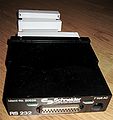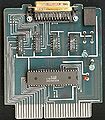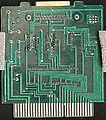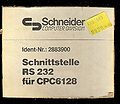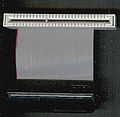Difference between revisions of "Schneider RS232 Interface"
(→I/O Ports) |
(→I/O Ports) |
||
| Line 18: | Line 18: | ||
== I/O Ports == | == I/O Ports == | ||
| − | |||
| − | |||
| − | |||
| − | |||
| − | |||
| − | |||
| − | |||
| − | + | Default I/O addresses are F8E0h-F8EFh (though the interface can be jumpered to use different addresses). | |
| + | |||
| + | F8E0h - Indirect Data Register | ||
| + | F8E1h - General Purpose I/O Data Register (0=Low, 1=High) | ||
| + | F8E2h - Interrupt Pending Register B (write 0=clear, 1=unchanged) ;\ | ||
| + | F8E3h - Interrupt Pending Register A (write 0=clear, 1=unchanged) ; | ||
| + | F8E4h - Interrupt in-Service Register B ; not used | ||
| + | F8E5h - Interrupt in-Service Register A ; | ||
| + | F8E6h - Interrupt Mask Register B (0=masked, 1=unmasked) ; | ||
| + | F8E7h - Interrupt Mask Register A (0=masked, 1=unmasked) ;/ | ||
| + | F8E8h - Indirect Index and Interrupt Vector Register | ||
| + | F8E9h - Timers A and B Control Register ;\ | ||
| + | F8EAh - Timer B Data Register ; not used | ||
| + | F8EBh - Timer A Data Register ;/ | ||
| + | F8ECh - USART Control Register | ||
| + | F8EDh - Receiver Status Register | ||
| + | F8EEh - Transmitter Status Register | ||
| + | F8EFh - USART Data Register | ||
| + | |||
| + | For details on the registers, see [[Z80-STI]]. | ||
== Software == | == Software == | ||
Revision as of 19:12, 11 May 2010
RS232 Interface for the CPC by Schneider. Schneider is the german distributor for Amstrad CPC hardware (however, this interface seems to be Schneider's own invention, not an Amstrad product).
Note: The uncommon shape of the housing dates back to a Schneider BTX modul (which was being intended to be plugged into Schneider Television Sets). Apparently Schneider produced too many housings, and re-used them for the RS232 interface. Actually, a RS232 interface is very much the same as a BTX interface (the actual BTX modem must be rented separately from Deutsche Bundespost), so even the PCB may be (almost/exactly?) the same for both devices.
Contents
Pictures
- The Schneider RS232 interface
I/O Ports
Default I/O addresses are F8E0h-F8EFh (though the interface can be jumpered to use different addresses).
F8E0h - Indirect Data Register F8E1h - General Purpose I/O Data Register (0=Low, 1=High) F8E2h - Interrupt Pending Register B (write 0=clear, 1=unchanged) ;\ F8E3h - Interrupt Pending Register A (write 0=clear, 1=unchanged) ; F8E4h - Interrupt in-Service Register B ; not used F8E5h - Interrupt in-Service Register A ; F8E6h - Interrupt Mask Register B (0=masked, 1=unmasked) ; F8E7h - Interrupt Mask Register A (0=masked, 1=unmasked) ;/ F8E8h - Indirect Index and Interrupt Vector Register F8E9h - Timers A and B Control Register ;\ F8EAh - Timer B Data Register ; not used F8EBh - Timer A Data Register ;/ F8ECh - USART Control Register F8EDh - Receiver Status Register F8EEh - Transmitter Status Register F8EFh - USART Data Register
For details on the registers, see Z80-STI.
Software
Supported by "Starwriter".
Similar (or identical?) Interface
The circuit is very similar (or possibly indentical) to the Tim Riemann's RS232 interface, both circuits are using a Z80 STI, both mapped to the same I/O port addresses. Whether or not the circuits are fully compatible with each other is unknown. Some small details might differ. For example, the clock source being passed to the Z80 STI chip could be different.
Manual (german)
Datasheet
- A "Z80 STI" is a 40pin MK3801 chip from Mostek. Details on that chip are from the "MOSTEK 1982/1983 Microelectronic Data Book" (kindly made available by John Robertson).
- The MK68901 seems to be a newer/similar chip (but neither port addresses nor pinouts are backwards compatible).
